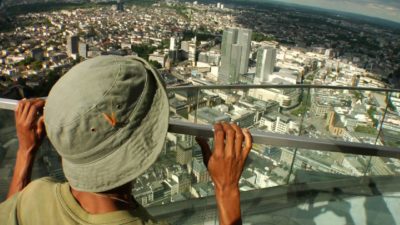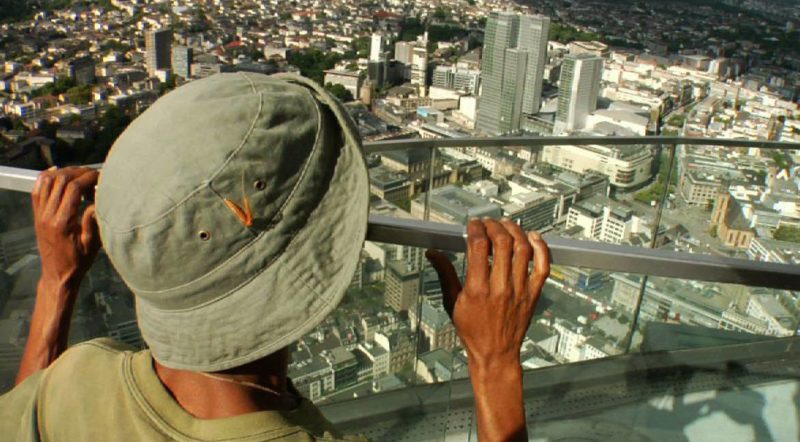INTERVIEW: ‘Ghostland’ offers rare perspective on Bushmen visiting Europe

Ghostland, the new documentary directed by Simon Stadler, allows audience members the rare chance to appreciate an interesting human perspective unlike any other in the field of anthropology.
So often the view of anthropologists and filmmakers is from the outsider looking in, and thus learning about communities around the world is often achieved through the lens of western culture.
Ghostland, currently playing at New York City’s Film Forum, doesn’t follow the same rulebook. Instead, the film documents the Ju/’hoasni Bushmen of Namibia, a beautiful desert country in southern Africa, from their own perspective. Rather than Stadler including a variety of academic talking heads or an omnipotent voiceover describing the Bushmen’s traditions, the filmmaker decides to view the world during these 90 cinematic minutes simply by translating the words of the Bushmen as they interact with one another and communities from around the world.
When the film depicts tourists coming to the Bushmen village in the Kalahari Desert, the audience can hardly hear the oohs and aahs of the vacationers. Instead, Stadler keeps his camera on the Bushmen and their conversations, their joking around, their upholding of traditions. The audience quickly learns what the Ju/’hoasni think of these tourists and also Namibia’s decision to ban hunting. Most tellingly, the camera allows the Bushmen to explain their thoughts on what life might be like outside their village. One quickly ascertains that the villagers documented in Stadler’s film are peaceful and nonjudgmental; however, their way of life is threatened in many ways. Because they are unable to hunt for food, they must earn dollars from these tourist visits.
Stadler, an anthropologist in his hometown of Frankfurt, Germany, explores these many cultural issues in Ghostland.
“A good friend of mine, he studied with me, anthropology, and he went to Namibia, 10 years, 12 years ago,” Stadler said recently in a phone interview. “He asked me, I think, 20 times, ‘Oh, you have to come to Namibia, and we should make a documentation about the Ju/’hoasni, about the Bushmen in Namibia.’ And I denied it every time because there’s so many documentaries about Bushmen — how they hunt, how they dance, what they are eating and everything like that, especially in the ‘50s. There were hundreds of different documentations about the Bushmen, and so I denied every time this project. And it was 2010, and she called me and said, ‘Simon, here’s a really crazy guy. It’s like a Crocodile Dundee from Namibia, and he’s a friend [of] the Bushmen. And they asked him so much in the last years how it will be outside of the Kalahari where the white men are living, and he organized a tourist bus for them. And he wants to make a tour with them two weeks through Namibia.'”
With this Crocodile Dundee character, Stadler found his opportunity to offer a fresh perspective on the community. This man, who is relegated to a background presence in the film, gave the Ju/’hoasni a chance to tour Namibia, visiting cultural sites, safari spots, other indigenous communities and busy life in the city.
Stadler had only three weeks to prepare for his trip to the southern African country, but the scheduling obstacles weren’t insurmountable. The director seems to thrive on briskness and spontaneity. “I took the camera out of my house, and a good friend of mine, she wanted to come with me,” he said. “She was responsible for the sound, and one week later, we are in the airplane to Namibia. And we stayed two weeks with them in the village without filming … and after this, we went with them on the tour.”
Stadler stayed two months in their village after the tour was complete. Then, six weeks later, an invitation came from Germany to bring a few of the villagers to Europe for a cross-cultural exchange. That visit, which serves as the climax for the film, offers not only a perspective on the Ju/’hoasni but also the many Europeans they met in Germany.
“There are so many different documentations about them, and it was every time the German, or the American or the British perspective,” he said. “They are so beautiful people, so it’s really worth to show their perspective about us, yeah. I think this is something new in this case. I have to say in the ‘80s and ‘70s in anthropology there was an … idea to change the point of view, and some anthropologists gave cameras to Indians. And they make their own film about their lifestyle, and I think this idea was still in my mind when we decided to make Ghostland. For us, it was really interesting to change the perspective, especially when they came to my hometown, to Frankfurt, and to Germany, and I think we can learn a lot about their knowledge. … It’s not like [the] last 100 years where the Europeans come to Africa, and we’ve got this Euro-centrist viewpoint every time. We want to do something new, and I hope we made it.”
Framing the entire movie is how the Bushmen have had their life upturned by the decision to quash their hunting practices. This has caused the Ju/’Hoasni to survive on tourists’ dollars — showing visitors their traditional dances, how they butcher an animal carcass and how they hunt (at least a re-creation of a hunt). Stadler said the eradication of the Bushmen’s hunting practices is a “bad influence” that changed the fabric of this village. In fact, he said there are four people from the community who are currently in jail because of the regulations.
“This law, it changed everything for them,” he said. “This Crocodile Dundee from Namibia, he brought the first tourist to them, so they can make money a little bit with the tourists. … So they have possibilities to survive, but the main part of the Bushmen, they are sitting on the street, begging for money, begging for food because they cannot survive. They don’t have enough food to survive, and so this is really a horrible future for them.”
Stadler’s problem with the hunting regulation has more to do with the trophy hunting business that sees outsiders traveling to Africa and paying tens of thousands of dollars to kill a leopard or elephant. Because trophy hunting generates revenue, the practice is allowed in certain countries. The Bushmen don’t have similar access to large quantities of money to hunt the wild game.
With tourists arriving on a regular basis and traditional hunting no longer allowed, there is the perpetual concern that some of the Bushmen’s cultural practices will be lost forever. Stadler said he believes that the village depicted in Ghostland will weather the changes and hold on to their cultural history.
“The village is so far away from everything,” he said. “There is no handy connection, no online connection, so they cannot really get deep inside of the white men. So the tourists are coming … and they don’t speak about the cultures of the white men because white men want to learn something about the Bushmen culture. So they are not losing so much in the moment of the contact with the white men, but on the other side, because they make this dance for the tourists, the culture and the tradition is really [surviving] at the moment. So many kids in other villages, they lost everything of the old dances, of the old songs of the Bushmen, and in this village, the songs are still alive.”
He added: “In the beginning, it was really strange to see, ‘Oh, this poor people. They have to survive with tourist business.’ But on the other side, it’s a possibility to survive first, and on the other side … if they know tourists are coming, they are dancing, celebrating. They are making fire, so it’s also a good education for the kids about their own tradition.”
Stadler spent a lot of time with the people of this village, and much of that time was spent on translating the Ju/’hoasni language. “We are sitting four weeks with them with a laptop on our knees in the sand and made the translation,” he said. “In the end, it costs us more than two years only the translation, but we want to be really authentic and don’t want to write something [that] is not right in the end, like subtitles. So it was a big work.”
Stadler said that he hopes audiences will look not only look at the Bushmen in a new light but also look differently at themselves because the documentary serves as more of a mirror than a microscope. “We can live in a different way,” he said. “We can share things. We can be nice. We can live together without conflicts like the Bushmen are doing still, and this is really beautiful.”
He concluded: “I learned really [that] human beings do not have to be bad. When you look today, our world is full of war and jealousy, and it’s really strange. And sometimes I have doubt about human beings, and when I look at the Bushmen, I understand humans beings can also be good without conflicts, without fighting, sharing what they have. And this is really beautiful. So I have a new perspective also about human beings. I learned something new about the human being. I think my connection will be staying until I die. I hope so.”
By John Soltes / Publisher / John@HollywoodSoapbox.com
Ghostland is currently playing at the Film Forum in New York City. Click here for more information and tickets.

